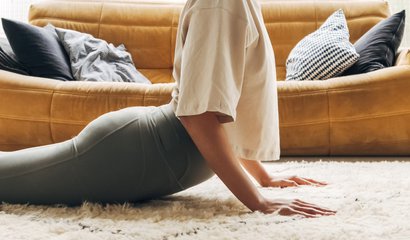Nov. 14, 2024
How Yoga Reduces Stress and Anxiety
Will 20 minutes of yoga a day really help reduce stress? Here’s the truth.
Why Yoga for Stress Relief Works
Let’s face it—stress is a sneaky companion, showing up in tight shoulders, restless thoughts, and that ever-present sense of overwhelm. If you’re looking for a way to manage it, yoga offers more than just a good stretch. It’s a practice that helps you tune in, reset, and build resilience against life’s pressures. And science backs this up.
Yoga goes beyond the physical. Yes, there’s movement, but it’s also about cultivating a mental state that promotes calm and clarity. Research shows that yoga influences the autonomic nervous system, helping shift your body from a stress-driven “fight or flight” mode to a more restful “rest and digest” state. This balance reduces stress and anxiety levels, giving your body the space to recover and your mind the chance to unwind. According to the National Institutes of Health, scientific evidence shows that yoga not only supports stress management, is helps supports mental health, mindfulness, healthy eating, weight loss and quality sleep.
A key component to yoga helping with all these varied wellness markers is: interoceptive awareness. This is your ability to sense what’s happening inside your body—like noticing when your heart races or your breath shortens. Yoga helps you strengthen this awareness, which can lead to better emotional regulation. In other words, you become more attuned to how stress shows up in your body and more equipped to manage it.
Yoga has also been shown to lower cortisol levels—the hormone responsible for your stress response. Over time, consistently lower cortisol can improve your mood, reduce anxiety, and even help with better sleep. It’s not just about feeling calm in the moment; it’s about creating lasting changes in how your body responds to stress.
Beyond these physiological benefits, yoga incorporates mindfulness and self-compassion. These practices encourage you to be kinder to yourself, reducing the self-criticism that often accompanies stress and anxiety. This mental shift can significantly improve your overall well-being, helping you approach life’s challenges with a clearer, calmer mindset.
So, if stress has you feeling stuck, yoga offers more than a way out—it’s a path to understanding and managing stress from the inside out. With each practice, you’re not just moving your body; you’re giving your mind and nervous system the reset they need.

Yoga for Anxiety
One of the most popular focuses at Heart and Bones Yoga is supporting the nervous system. For some, this means moving more to work through anxious energy, while others benefit from slow or even still practices. No matter where you fall on that spectrum, yoga offers a variety of tools to help ease anxiety by calming the mind and body. Let’s break it down so you can find the approach that works best for you.
How Yoga Calms the Nervous System
Yoga helps your nervous system switch gears from "fight or flight" to "rest and digest." Here’s how:
- Slower Heart Rate: Deep, steady breathing tells your body it’s safe to relax.
- Reduced Muscle Tension: Mindful movement releases physical stress that often builds up during anxious moments.
- Increased Focus: Concentrating on breath or movement interrupts racing thoughts and brings you back to the present.
Yoga Poses to Soothe Anxiety
Whether you need to release tension or settle into stillness, these poses can help:

Child’s Pose (Balasana)
A comforting, restful posture that encourages deep breathing.

Seated Forward Bend (Paschimottanasana)
Gently stretches the body while promoting relaxation.

Legs-Up-the-Wall Pose (Viparita Karani)
A restorative favourite for calming the mind and relieving physical tension.
Ready to start? Enjoy a 7 day free trial.
Explore our yoga for stress relief and yoga practice for nervous system regulation playlists to find the perfect routine for your needs. Start your journey to a balanced and resilient nervous system today.
How Much Yoga Do You Need to See Benefits?
The idea that yoga requires hours of commitment to be effective is a myth. Research shows that even short, consistent practices can lead to significant improvements in both mental and physical well-being. So, if you’re wondering how much yoga you need to start reaping the rewards, the answer is: not as much as you might think.
The Science Behind Short Yoga Sessions
Studies have found that practicing yoga for as little as 20 minutes a day can make a noticeable difference. One study highlights that short yoga sessions significantly reduce stress, anxiety, and fatigue while improving mood and focus.
Another study emphasizes that even brief yoga practices positively impact the autonomic nervous system, helping to shift your body from the "fight or flight" state into a more relaxed "rest and digest" mode. This shift is key to reducing cortisol levels, which are linked to chronic stress.
What Benefits Can You Expect from 20 Minutes of Yoga?
Here’s what regular short sessions can do for you:
- Stress Reduction: A quick yoga flow can lower cortisol levels and promote a sense of calm.
- Improved Focus: Yoga enhances cognitive function, helping you stay present and clear-minded throughout your day.
- Better Sleep: Regular practice, even in small doses, can improve sleep quality by relaxing the body and mind.
- Enhanced Mood: Studies show that yoga boosts serotonin levels, the "feel-good" neurotransmitter, contributing to a more positive outlook.
Experience Stress Relief with This Yoga Class
Studies referenced:
Shohani M, Badfar G, Nasirkandy MP, et al. The Effect of Yoga on Stress, Anxiety, and Depression in Women. Int J Prev Med. 2018;9:21. Published 2018 Feb 21. doi:10.4103/ijpvm.IJPVM_242_16
Deepeshwar S, Tanwar M, Kavuri V, Budhi RB. Effect of Yoga Based Lifestyle Intervention on Patients With Knee Osteoarthritis: A Randomized Controlled Trial. Front Psychiatry. 2018;9:180. Published 2018 May 8. doi:10.3389/fpsyt.2018.00180
Garcia MG, Estrella M, Peñafiel A, Arauz PG, Martin BJ. Impact of 10-Min Daily Yoga Exercises on Physical and Mental Discomfort of Home-Office Workers During COVID-19. Hum Factors. 2023;65(7):1525-1541. doi:10.1177/00187208211045766



